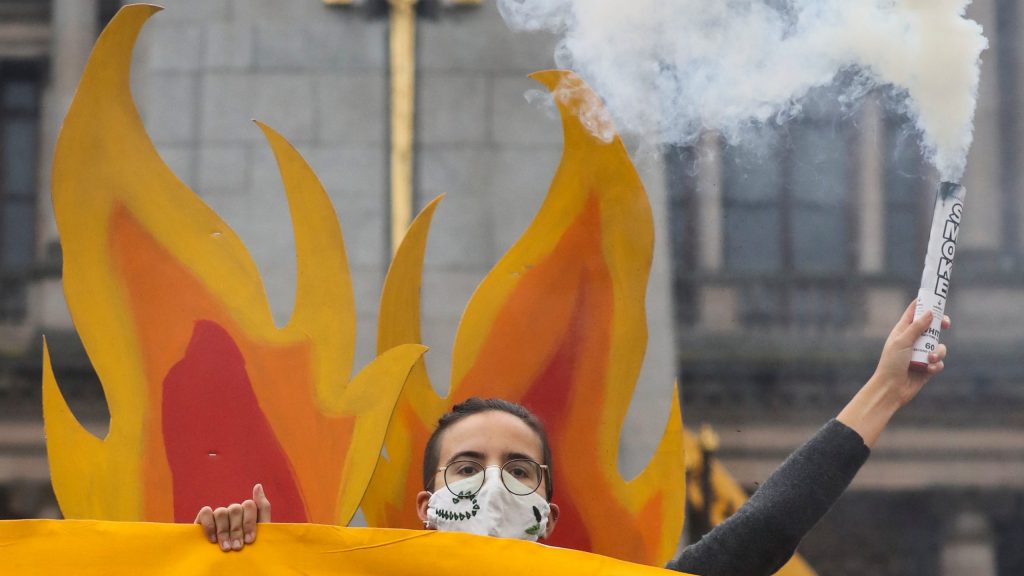When it comes to protecting God’s creation, leaders of Catholic movements active in the COP26 Glasgow summit say it’s time for a little less conversation and a lot of more action.
“Pope Francis is urging world leaders to take the boldest possible actions to heal and protect our planet,” said Eric LeCompte, Executive Director Jubilee USA Network. His focus on the environment and protecting our common home, is galvanizing world leaders to do more.
He believes that for too long, humanity has failed to do enough and it’s running out of time.
“COP 26 needs to be about implementation and understanding that many decisions on climate are being made a part of pandemic response by the G20 and the International Monetary Fund,” he told Crux. “Those decisions need to be influenced by COP 26.”
LeCompte said one issue that needs to be addressed is supporting developing countries in transitioning to green economies and ensuring they receive the aid promised to deal with increased climate driven natural disasters and challenges.
“This is one of the main themes of Laudato Si’,” said LeCompte, referring to Pope Francis’ 2015 encyclical on the care of creation. “The industrialization of the North occurred by taking natural resources from the South. The consumption of these resources by developed countries fueled a climate crisis that created climate driven challenges and food shortages for developing countries. In this sense the Church expresses that because of this, the North owes a debt to the South.”
Tomas Insua, the head of the Laudato Si’ movement, formerly known as the Global Catholic Climate Movement, said that although some activists are pointing to population control measures to combat climate change, the Church’s position is very clear: “The ecological crisis comes fundamentally for the hyper-consumerism of a small part of the world’s population.”
However, he added that the fact that “some try to push the population control matter from a window is no reason not to enter in dialogue with them.”
According to LeCompte, the fact that the Church has a long history of involvement and focus on climate is an “incredible asset” for its negotiating role at COP26.” He also pointed out that it was Pope Benedict XVI who moved the Church to be more active “in protecting our common home.”
The German pontiff is, in fact, the “original” green pope, labeling a refusal to recycle when available a sin, and making several investments, like installing solar panels in the Vatican to reduce its carbon footprint.
Speaking with Crux in Rome on the eve of heading to Glasgow, Molly Burhans acknowledged that, after the first reports she got from friends and colleagues who were already in the summit, she has “little hope for COP26, but a lot of hope for humanity.”
An American cartographer, data scientist and environmental activist, the 32-year-old woman founded GoodLands, an organization which is mobilizing the Catholic Church to use its land for environmental and social justice purposes.
In the months leading to the Oct 31- Nov 12 meeting in Scotland “we had a bigger build up than to any other conference, except perhaps for COP21 in Paris,” said Burhans, the United Nations 2019 Young Champion of the Earth.
“I think people are not only burnt out, but they’re angry and upset because since Paris, us environmental activists have fought for change, and instead of real changes, we’ve seen the issue becoming even more politicized, even though it’s something that touches everyone on every aisle of the political spectrum,” she said. “We’ve seen more divisiveness in the language and more empty words.”
For Burhans, involvement in addressing climate change and caring for God’s creation is about “caring for your neighbor: If you want to feed the hungry, you first have to grow the food. If you want to help the poor, you have to find a house for them.”
It’s not about the polar bears and tree hugging
“Climate change is not about saving the polar bear,” said Insua. “The environmental movement failed in its communication.”
And it’s here that Pope Francis’s 2015 encyclical Laudato Si’ really made a difference: Insua said the pope helped change the optics, transforming the debate into a social issue, because those who are suffering extreme weather conditions are the poor.
“Laudato Si’ was a huge contribution, and I believe that as a Church we’re not fully conscious of the impact it’s had,” the layman said. “Today, Pope Francis and Greta Thunberg [the 18-year-old Swedish environmental activist] are the two leading voices in this issue, because they’re speaking the uncomfortable truths politicians don’t want to acknowledge.”
Burhans said, “I mean, I love polar bears, but it’s about saving your neighbor.”
“It’s about saving our souls. It’s about saving our communities. It’s about seeing potential in land: Where there’s a lawn there’s an infinite number of possibilities to create something,” she added.
Her first company – of which she now owns no shares though it’s still operating – was an agriculture company that builds indoor vertical farms, providing microgreens and other foods. She created when she was discerning a religious vocation, because she saw the power of regenerative agriculture and land management in the lives of religious sisters who were helping single mothers and children through soup kitchens and other charitable endeavors.
Today, the company, based in Springfield, Massachusetts, is operated by at-risk youth, who learned about agriculture and gained entrepreneurial skills. Most of them, she said, go to college today.
“Caring about God’s creation,” she insisted, “is much more than tree-hugging. It’s caring for your neighbor.”

